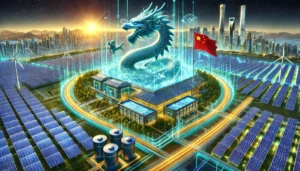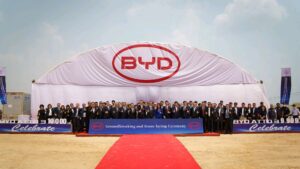 With America choosing, stupidly, calling oil “energy” it’s time to admit that China won the War Against Oil. (Illustration from ChatGPT.)
With America choosing, stupidly, calling oil “energy” it’s time to admit that China won the War Against Oil. (Illustration from ChatGPT.)
China’s industrial policy of subsidizing entrepreneurs and withdrawing subsidies when companies become world class won over America’s alternating laissez-faire and corporate subsidy approach. Not only was China’s policy more consistent, it was more entrepreneurial, because letting people fail is a hallmark of true capitalism.
America can use tariffs to keep these goods out of our country, and the approach may even work in Europe. But it won’t keep these goods out of other countries. Half the world’s people live in the broad swath of India, China and Southeast Asia. This is where the globe’s economic momentum is building.
As I’ve said for 15 years, oil is not energy. It is fuel. Just like sunlight is fuel, or wind is fuel, or the vast geothermal energy under our feet is fuel. Fuel must be turned into energy by some sort of machine. A car engine is a machine for creating mechanical energy. A solar panels is a machine for creating electrical energy.
It takes infrastructure to turn fuel or energy into usable work, and for a century oil had an advantage there. But storage is now widely available. It can be as cheap as a bunch of used car batteries, as simple as pushing water up above a hydroelectric dam.
The World’s Most Important Companies

BYD is vertically integrated, using its batteries to dominate the electric car market. CATL supplies the rest of the pack. Both companies remain hungry because, unlike Tesla, they have domestic rivals still trying to knock them out. They’re not monopolists. The same thing has happened with solar panels. China has several competitors while the U.S. has only First Solar. It’s no contest.
China entered the War Against Oil because its dependence on coal was choking its people. Even the Chinese Communist Party could see that. Coal is big still a factor in China’s energy mix, and this provides a second level of competition for the “green energy” companies.
There are also enormous markets to be won across Asia, Africa, and Latin America. China will win those markets. The limited utility infrastructure of these countries makes locally produced solar power even more competitive.
Then there’s the “burning” of these power sources. A car, or anything using fossil fuel energy, turns only about 40% of the energy it produces into useful work. The rest becomes heat. It’s wasted. A battery’s entire energy goes into useful work. Your e-bike doesn’t get hotter as you ride it.
American solar energy companies still don’t emphasize this enough. They talk about solar panels being 22% efficient and natural gas being 60% efficient. But this is misleading. It doesn’t matter how efficient a panel is in turning solar rays into electricity. The energy source is still there once the power is produced. The fossil fuel isn’t.
What Happens Next?

Meanwhile, the climate will continue to become the weather. How many more hurricanes must rake the coast of Florida and the eastern seaboard before someone gets a Clue? The answers to our problems are on the other side of the world, and we’re building walls against them. The result will be economic and social disaster on an unprecedented scale.










